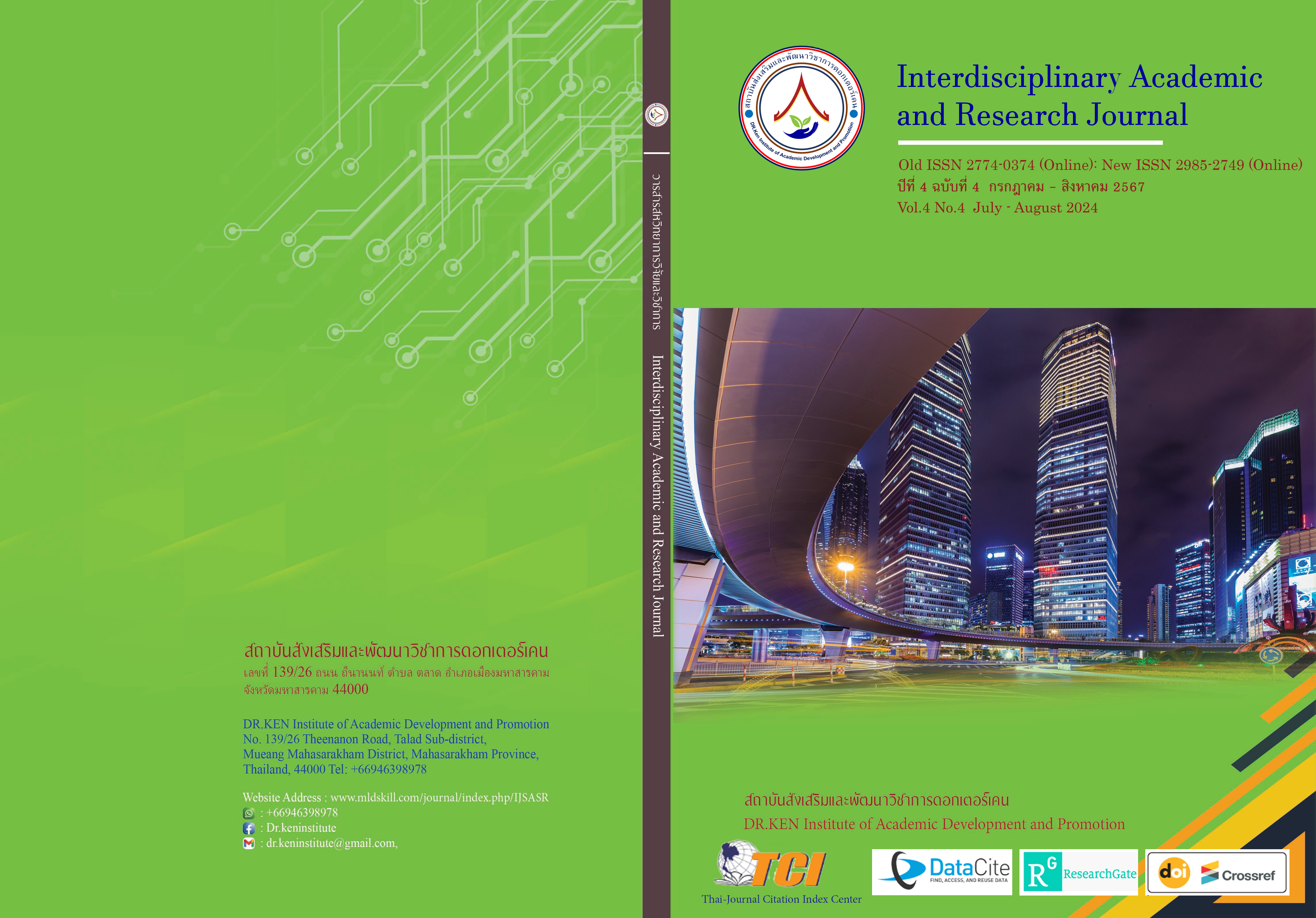Enhancing Resilience in Depression Students Through the Practice of Metta Bhavana According to Buddhist Principles
DOI:
https://doi.org/10.60027/iarj.2024.277226Keywords:
Compassion; , Metta Bhavana; , Loving-Kindness Meditation; , ResilienceAbstract
Background and Aims: The challenges and problems that students face grow in number and size as they mature into adulthood, a time of obligations and expectations. Many students find it difficult to adjust, or they may adjust slowly, which can lead to long-term stress and eventually depression. This article therefore offers a way to prevent depression, which over time develops into depression and is found to rise annually due to sick leave taken by students who have been diagnosed and certified by specialized doctors. Instead, it practices loving-kindness meditation by Buddhist principles.
Methodology: This research is based on an analysis of linked scholarly publications. Next, utilize descriptive presentation techniques while analyzing and synthesizing the study's objectives.
Results: Following Buddhist guidelines, students can enhance their ability to recover from depression by engaging in loving-kindness meditation. These guidelines include: Before beginning the activity, set your intention, focus your attention until your mind is still, release a loving-kindness breath, center your thoughts, and humble them toward quiet for five minutes. Spread loving-kindness to yourself when you emerge from meditation, allowing happiness to arise within yourself first. Next, spread loving-kindness to all living things, enabling the happiness stream to expand widely and not just within ourselves. The act of being kind to others Similar to a brain program, meditation necessitates repeated contemplation and thought. It can aid in the development of more powerful positive traits when consistently practiced. There are three advantageous traits in this respect: (1) recognizing your advantages and strengths; (2) contentment with your life; and (3) gratitude for both the people in your life and those around you. The development of a positive outlook raises the bar for interpersonal and adaptive skills, which are the cornerstones of "The Power of Resilience."
Conclusion: By practicing loving-kindness meditation and abiding by Buddhist precepts, students can strengthen their resilience and overcome depression. Positive characteristics like self-awareness, contentment, and thankfulness are fostered by this practice, and they improve the interpersonal and adaptive abilities that are crucial for resilience.
References
กรมสุขภาพจิต (2551).เปลี่ยนร้ายกลายเป็นดี พลังสุขภาพจิต RQ: Resilience Quotient. กรุงเทพฯ: สำนักวิชาการสุขภาพจิต กรมสุขภาพจิต กระทรวงสาธารณสุข.
กรมสุขภาพจิต. (2551). RQ พลังสุขภาพจิตพาคุณก้าวผ่านวิกฤตและความไม่แน่นนอนของชีวิตได้อย่างสง่างาม. กรุงเทพฯ : ดีน่าดู.
ขันทอง วิชาเดช. (2561). การแผ่เมตตาในสังคมไทยตามคัมภีร์พระพุทธศาสนาเถรวาท. วิทยานิพนธ์พุทธศาสตรดุษฎีบัณฑิต : มหาวิทยาลัยมหาจุฬาลงกรณราชวิทยาลัย.
คิมจูฮวน. (2564). ยืนหยัดได้ไม่ว่าจะเกิดอะไรขึ้น. กรุงเทพฯ : อมรินทร์ฮาวทู อมรินทร์พริ้นติ้งแอนด์พับลิชชิ่ง.
จันทร์จิรา วสุนธราวัฒน์ และคณะ. (2557). ผลของการสวดมนต์และแผ่เมตตาต่อการตอบสนองด้านร่างกายในผู้สูงอายุ. พิษณุโลก : มหาวิทยาลัยนเรศวร.
ตีรณ พงศ์มฆพัฒน์. (2563). ผลของเมตตา. Retrieved on 3 June 2020, from http://www.matichon.co.th/columnists/news_2386311
พระธรรมปิฎก (ป. อ. ปยุตฺโต). (2545). พจนานุกรมพุทธศาสตร์ ฉบับประมวลธรรม. พิมพ์ครั้งที่ 11. กรุงเทพฯ : สหธรรมิกจำกัด.
พระธรรมรักขิต. (2543). เมตตาภาวนา. กรุงเทพฯ: ธรรมมะอินเทรนด์.
ราชบัณฑิตยสถาน. (2556). พจนานุกรม ฉบับราชบัณฑิตยสถาน พ.ศ. 2554. พิมพ์ครั้งที่ 2. กรุงเทพฯ. สำนักงานราชบัณฑิตยสถาน.
วิมลวรรณ ปัญญาว่อง, รัตนศักดิ์ สันติธาดากุล, โชษิตา ภาวสุทธิไพศิฐ. (2563). ความชุกของภาวะซึมเศร้าและความเสี่ยงฆ่าตัวตายในวัยรุ่นไทย : การสำรวจโรงเรียนใน 13 เขตสุขภาพ. Journal of Mental Health of Thailand. 28(2), 136-149.
สมเด็จพระพุทธโฆษาจารย์ (ป. อ. ปยุตฺโต), (2560). ตามพระใหม่ไปเรียนธรรม. Retrieved on 3 April 2024, from: https://www.youtube.com/playlist?list=PLYawXfPOTSVuDN7GXfupsin1SOcmR6ETf
หลวงพ่อจรัญ ฐิตธมฺโม. (2537). วิธีแผ่เมตตาและอุทิศส่วนกุศล. Retrieved on 3 April 2024, from https://www.amphawan.net/กฎแห่งกรรม-เล่ม-๙/วิธีแผ่เมตตาและอุทิศส่/
หลวงพ่อปราโมทย์ ปาโมชฺโช. (2565). เมตตาเป็นธรรมสำคัญมาก. Retrieved on 3 April 2024, from https://www.dhamma.com/compassion/
อารี นุ้ยบ้านด่าน และคณะ. (2551). ผลของการฝึกสมาธิแบบเมตตาภาวนาต่อความเครียดของนักศึกษาพยาบาล. สงขลา : มหาวิทยาลัยสงขลานครินทร์.
Davies, E.B., Morriss, R., & Glazebrook, C. (2014). Computer-delivered and web-based interventions to improve depression, anxiety, and psychological well-being of university students: a systematic review and meta-analysis. Journal of medical Internet research, 16 (5), 103-107.
Gilligan, R. (2000). Adversity, resilience, and young people: the protective value of positive school and spare time experiences. Children & Society, 14 (1), 37-47.
Grotberg, E.H. (1999). Tapping your inner strength: How to find the resilience to deal with anything. New Harbinger Pubns Inc.
Islam, M.A., Low, W.Y., Tong, W.T., Yuen, C.W., & Abdullah, A. (2018). Factors associated with depression among University Students in Malaysia: A cross-sectional study. KnE Life Sciences, 4 (4), 415- 427.
Quirk, M.J., & Ivtzan, I. (2018). Soft is hard: building resilience with loving-kindness meditation at work. Int J Complement Alt Med, 11 (3),125-131.
Werner, E.E. (1989). Children of the Garden Island. Scientific American. 260 (4), 106-111.
Downloads
Published
How to Cite
Issue
Section
License
Copyright (c) 2024 Interdisciplinary Academic and Research Journal

This work is licensed under a Creative Commons Attribution-NonCommercial-NoDerivatives 4.0 International License.
Copyright on any article in the Interdisciplinary Academic and Research Journal is retained by the author(s) under the under the Creative Commons Attribution-NonCommercial-NoDerivatives 4.0 International License. Permission to use text, content, images, etc. of publication. Any user to read, download, copy, distribute, print, search, or link to the full texts of articles, crawl them for indexing, pass them as data to software, or use them for any other lawful purpose. But do not use it for commercial use or with the intent to benefit any business.
















.png)


